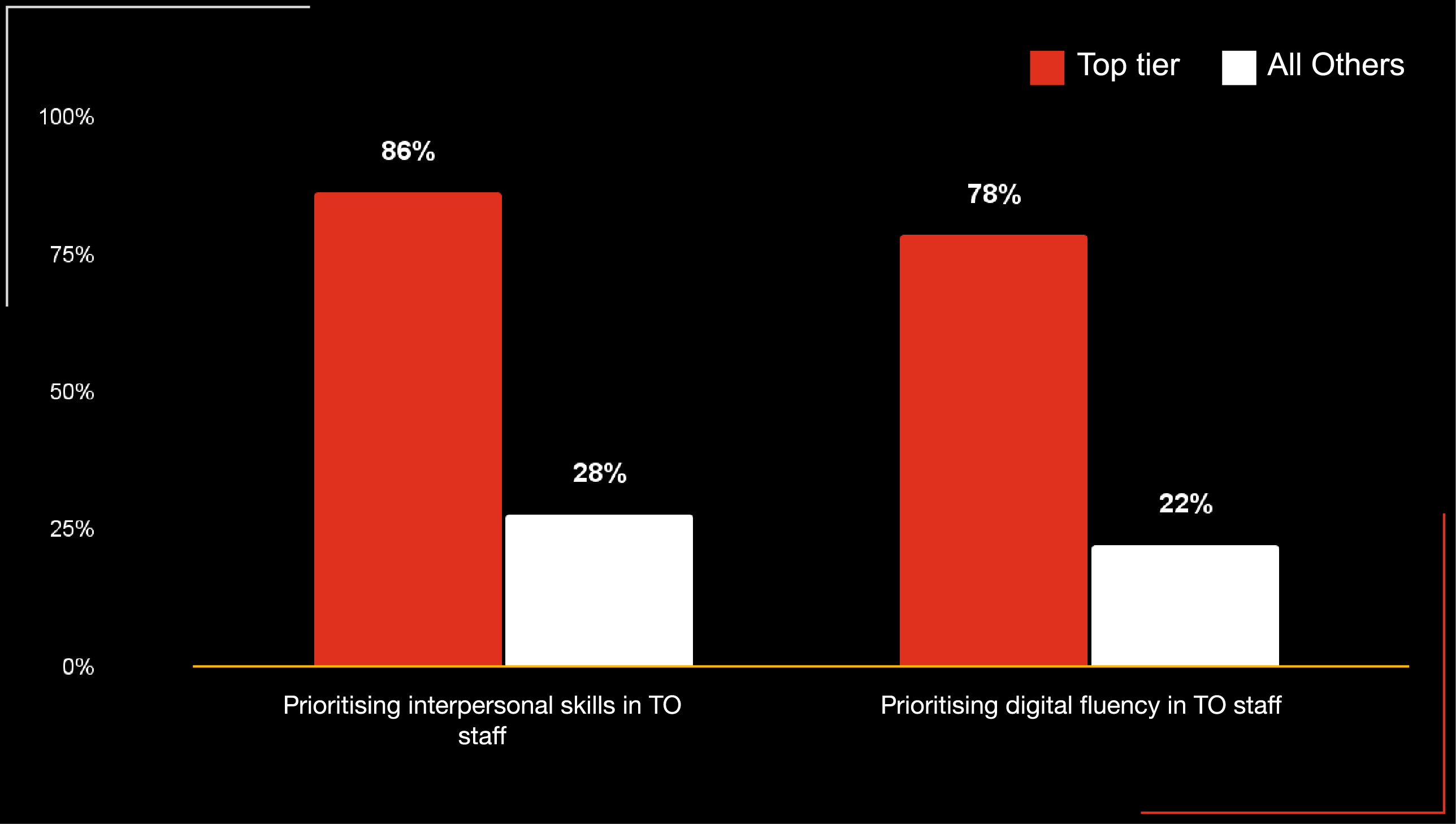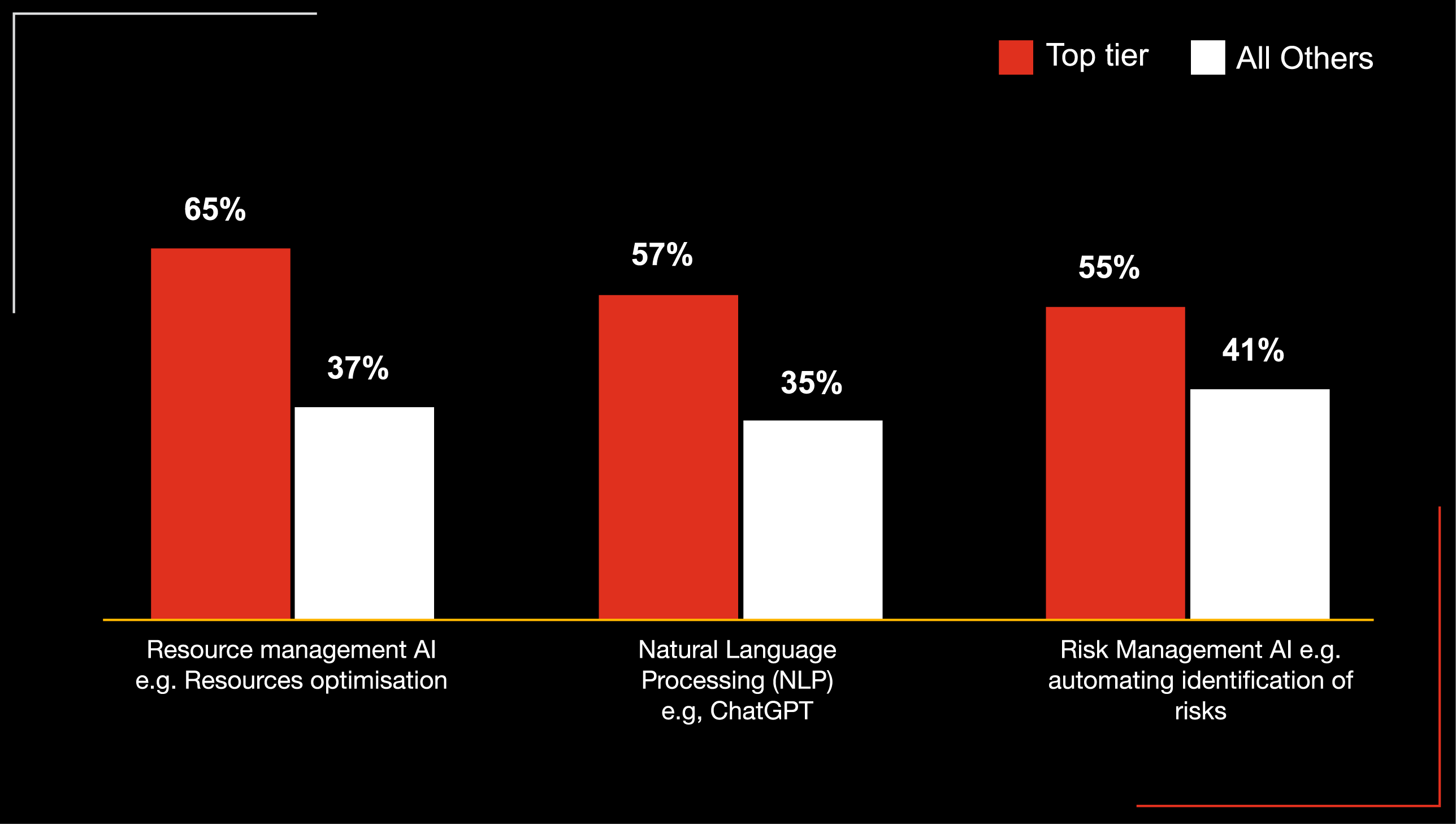Executive summary
Transformation is critical to build competitive advantage for organisations
PwC’s 27th Annual CEO Survey: Middle East Findings found that 48% of Middle East CEOs don’t think their organisations will be economically viable 10 years from now if they do not evolve, up from 35% last year. This indicates that transformation is top of mind of business leaders in the region, with 69% of CEOs indicating technological change and 63% citing changes in customer preference as critical factors shaping the creation, delivery, and capture of value over the next three years.
Transformation Offices (TOs) responsible for steering organisations through complex changes and external challenges are essential in driving organisational transformation success. They serve as catalysts for long-term value creation, with top-tier TOs actively facilitating improved revenue and customer growth.
Exploring advanced TO models offers valuable insights for organisations looking to build or enhance their own. However, TO design is an ongoing process, requiring organisations to continually evolve their models to maximise impact.
Our first report as part of the Transformation and Project Management series focused on value delivery in the Middle East, while in this report we explore human-led, tech-powered strategies that draw on lessons from the region's most mature TOs, offering insights to help organisations accelerate their TO maturity and cultivate a value-driven culture. Establishing robust processes for continuous improvement, leveraging agile digital solutions, and maintaining a people-centred approach are essential to building a positive, collaborative working environment.
Key aspects covered in the report include:
Integrating digital solutions
Cultivating a positive work culture
Integrating digital solutions
The journey towards the maturity of the Transformation Office is a continuous learning process, with technology acting as a critical accelerator. Our research shows that top-tier TOs lead in this area, leveraging a broader suite of tools to enhance value delivery.
Figure 1: The top-tier - early adopters of technology to drive increased value from projects

Figure 1 shows that - across all technologies included in our survey - The top-tier are more likely to use tech-enabled approaches. In particular, they prioritise the use of predictive analytics, intelligent project scheduling and AI - used by around two-thirds. By integrating technological solutions across the delivery process, organisations can effectively monitor value delivery and empower the TO to maximise value in the following areas.
Automation empowering the transformation practitioner
Tech-enabled automation allows organisations to react quickly to risks and changes in the delivery environment, while freeing up transformation practitioners to focus on value delivery. By leveraging technology to streamline projects, transformation practitioners can focus on understanding critical organisation goals, building cross-functional relationships and contributing to key strategic outcomes.
To thrive in this value-driven environment, modern transformation practitioners need to combine technical expertise with strong communication and leadership skills. The most mature TOs recognise this need, prioritising digital fluency and interpersonal skills in project and TO staff.
Figure 2: Top-tier TOs are human-led and tech-powered

Figure 2 shows that - top-tier TOs prioritise interpersonal skills and digital fluency ‘all of the time’. Developing these vital skills requires investment from the organisation.
AI-enhanced value delivery
The use of Artificial Intelligence (AI) to capture and create more value from projects is a key opportunity for organisations in the region. Optimism about the potential of AI in the region is high, with 73% of Middle East CEOs believing AI will significantly change the way their company delivers value in the next three years. Additionally, six in 10 Middle East organisations expect AI adoption to increase revenue and profitability in the next 12 months. The potential of AI to create more value from transformations is further evidenced by its application among top-tier TOs.
Top-tier TOs are more likely to be using resource management AI to streamline resource allocation for organisations to bolster the efficiency of project delivery, as well as using risk management AI to automate the identification of risks (Figure 3). The ability for AI applications to analyse vast amounts of data enables early identification of potential risks and resource inefficiencies at a much earlier stage than traditional methods. This proactive approach empowers TO to take preemptive measures, ensuring continued delivery of value.
Figure 3: Top-tier TOs are more likely to be using AI to enhance value delivery

Figure 3 shows the implementation of various AI technologies by top-tier TOs compared to all other organisations.
Improving accessibility and visualisation of data
To enable this, project data and KPIs need to be visualised and collated to provide a single source of truth, for example, through the use of dashboards. The TO has an important role in the design and sharing of these dashboards to ensure they provide the right insight to the right people. This includes helping cross-functional teams and departments understand how to leverage these insights to enhance their value delivery, such as understanding how to benchmark their performance against targeted outcomes. The ultimate goal is to develop teams that can self-serve, boosting efficiency and productivity.
Taking your Transformation Office to the next level:
Our recommendations
No matter what industry sector, every organisation today has to address how they evolve to remain relevant, to create real value for their stakeholders and to do so while integrating new technology, figuring out how to work with ecosystem partners, addressing how they meet climate commitments, solving how they find and develop the right talent and how they keep adapting to a world that is changing around them, all the time.
To continue the TO maturity journey, it is imperative for organisations to embrace digital innovation and cultural transformation. By delivering people-focused solutions that understand how best to support and enable value-delivery, TOs can continue to enhance its influence and realise added benefits from outcome-based approaches to projects.
Sustained outcomes are achieved by integrating a strategy aligned with value and distinct capabilities, along with an operational model that blends human expertise with advanced technology. By advancing TO maturity, organisations can establish an always-on transformation capability, seamlessly bridging strategy to execution and embedding it within their organisational DNA.
This report is part two of three from PwC’s Middle East transformation and project management survey series.
Transformation and project management survey part 2
Contact us
Sameer Saleh
Transformation Management Unit Lead Partner, PwC Middle East
Mahmoud Khodair
Transformation Management Unit Partner, PwC Middle East
Tamer Elleisi
Transformation Management Unit Partner, PwC Middle East
Khalil Alhares
Transformation Management Unit Director, PwC Middle East









